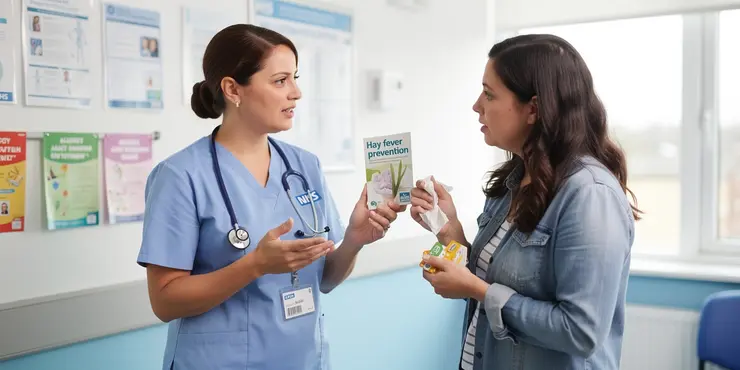
Find Help
More Items From Ergsy search
-
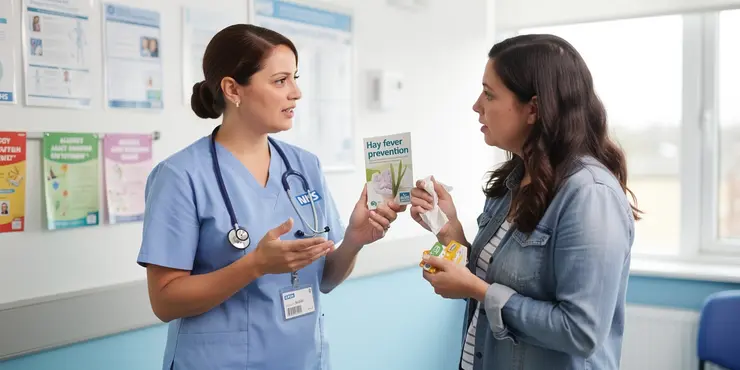
Can hay fever be prevented?
Relevance: 100%
-
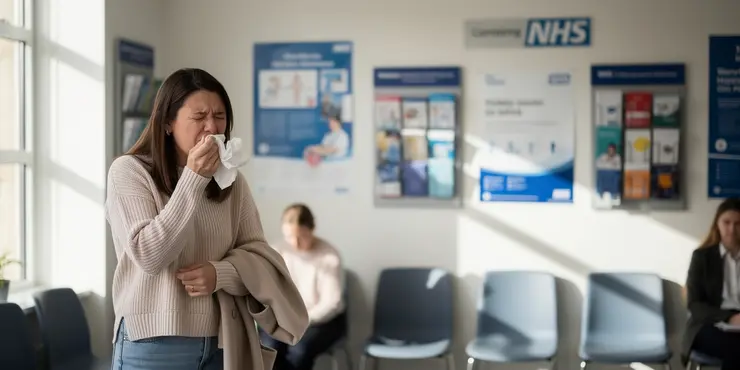
What is hay fever?
Relevance: 89%
-
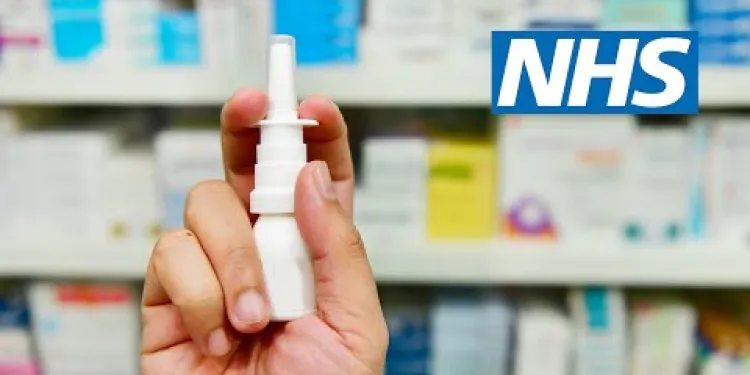
Hay fever advice | NHS
Relevance: 85%
-
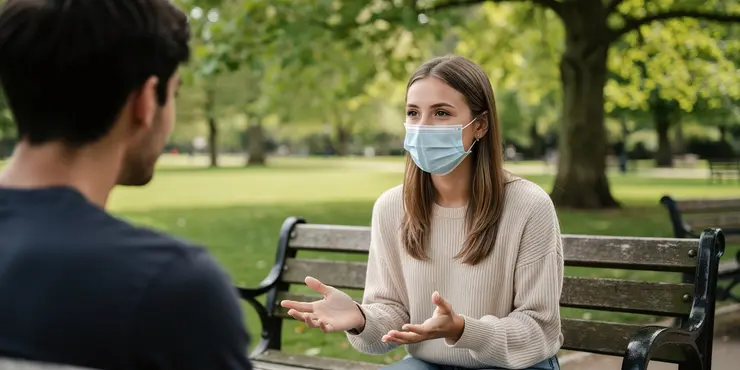
Do masks help with hay fever?
Relevance: 84%
-
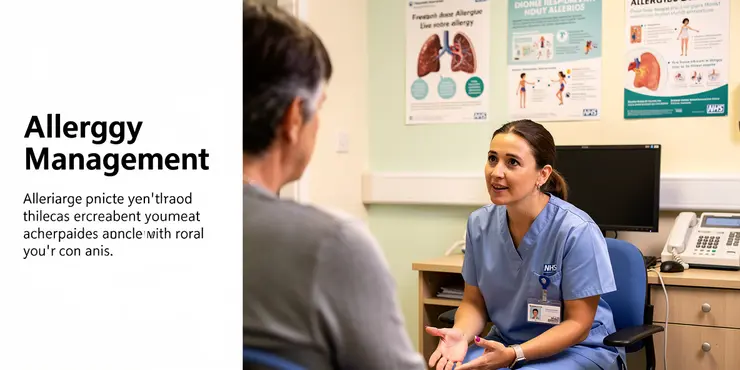
Is there a link between hay fever and asthma?
Relevance: 82%
-
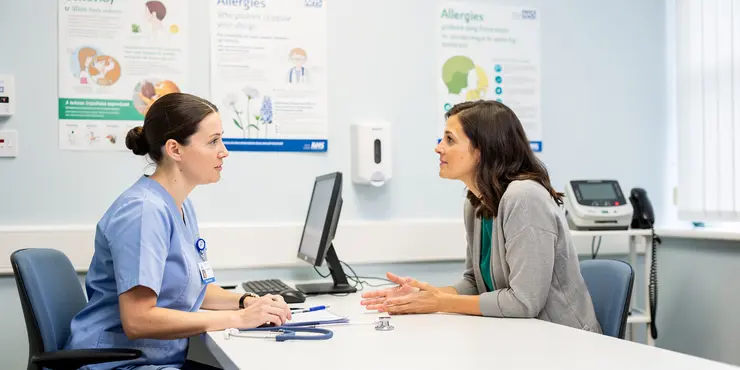
What are the common symptoms of hay fever?
Relevance: 80%
-
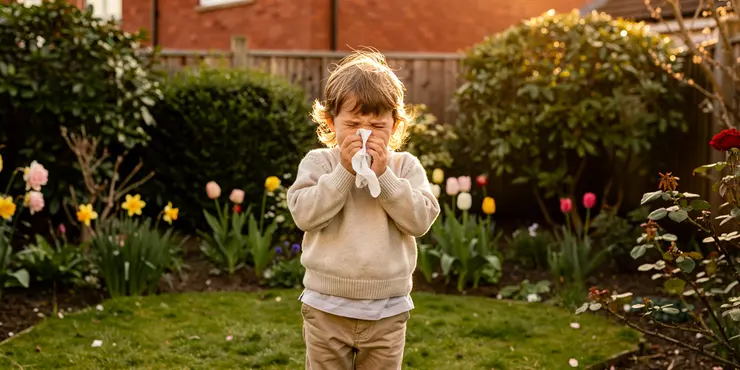
Can children develop hay fever?
Relevance: 79%
-
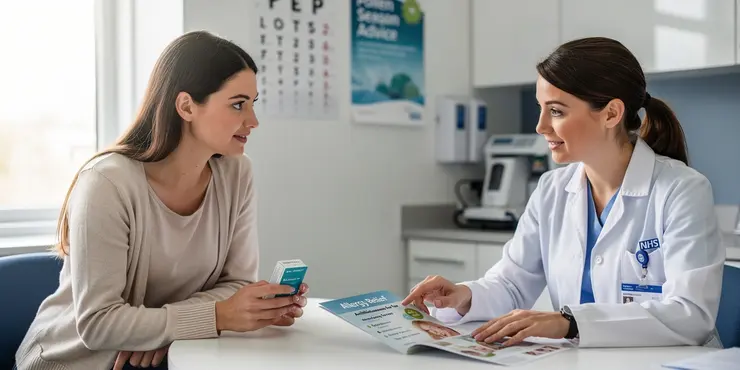
Antihistamines how they work with hay fever
Relevance: 79%
-

Can hay fever occur year-round?
Relevance: 78%
-
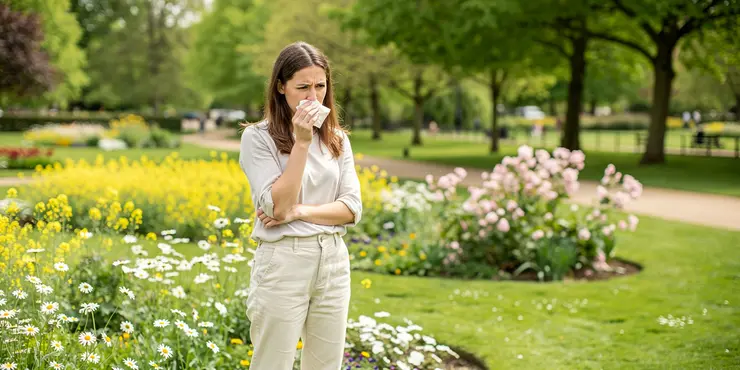
Are some people more prone to hay fever?
Relevance: 77%
-

Do pets contribute to hay fever?
Relevance: 77%
-
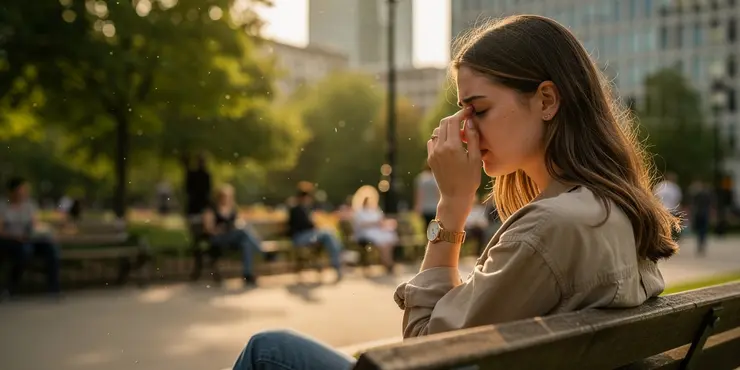
Is hay fever more common in urban areas?
Relevance: 76%
-

Can diet influence hay fever symptoms?
Relevance: 76%
-

Can hay fever symptoms mimic other conditions?
Relevance: 76%
-
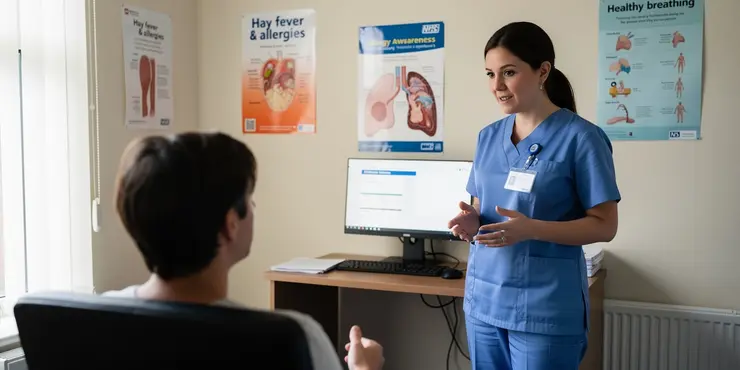
Do all plants produce pollen that causes hay fever?
Relevance: 74%
-

Why are experts warning of rising hay fever cases?
Relevance: 74%
-
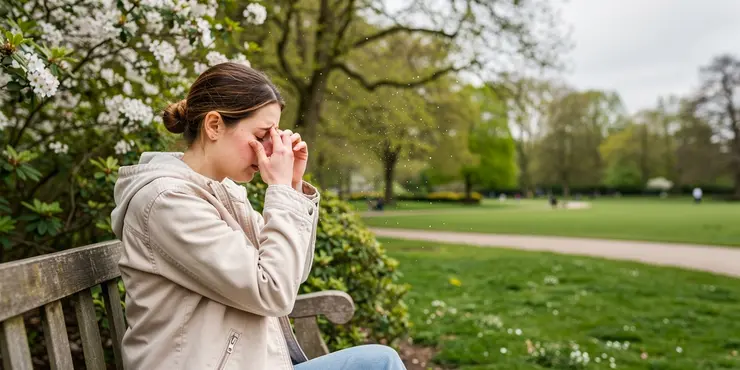
How does pollen affect people with hay fever?
Relevance: 74%
-
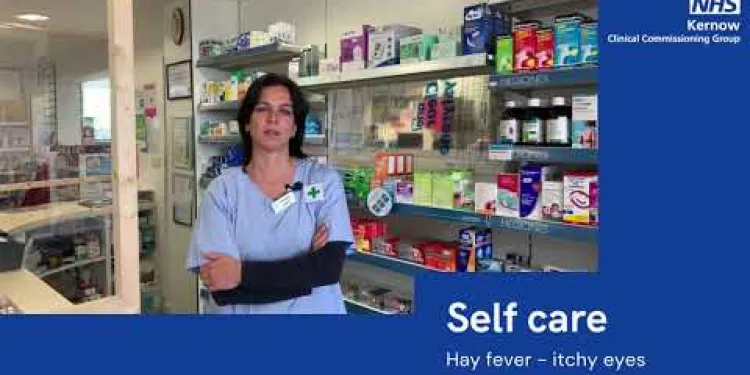
Self care - hay fever itchy eyes
Relevance: 74%
-
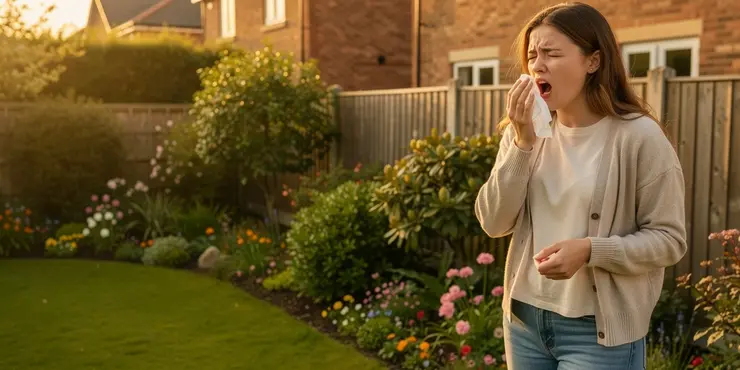
Experts Warn of Rising Hay Fever Cases as Pollen Counts Surge
Relevance: 72%
-
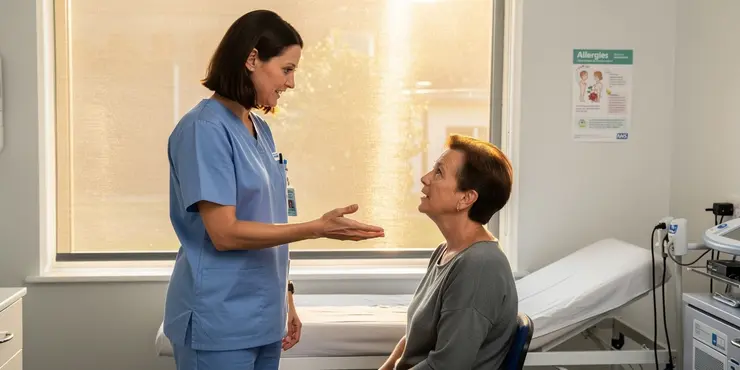
Can mosquito screens help reduce hay fever symptoms?
Relevance: 67%
-
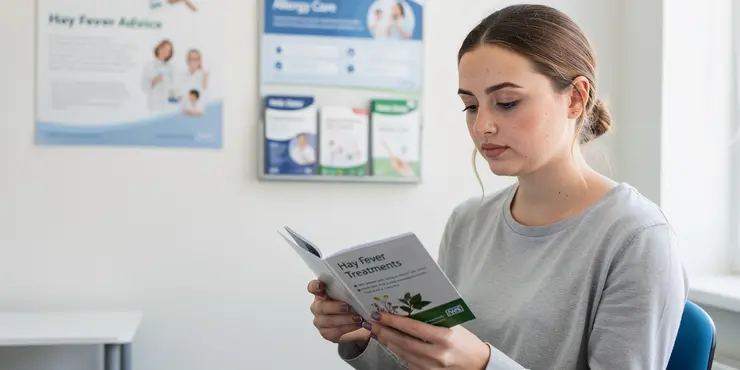
Are there any treatments for hay fever?
Relevance: 60%
-
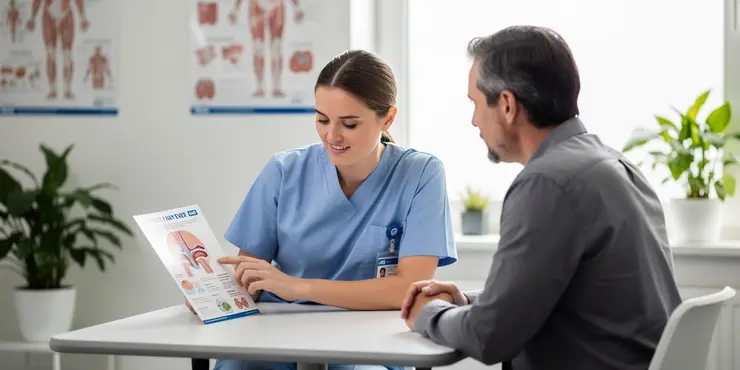
How long does a typical hay fever season last?
Relevance: 52%
-
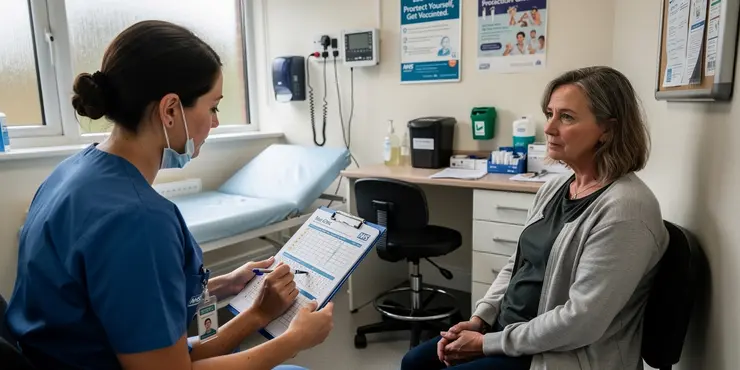
Is there a risk of yellow fever being spread by mosquitoes in the UK?
Relevance: 38%
-

Can dengue fever be contracted in the UK?
Relevance: 38%
-
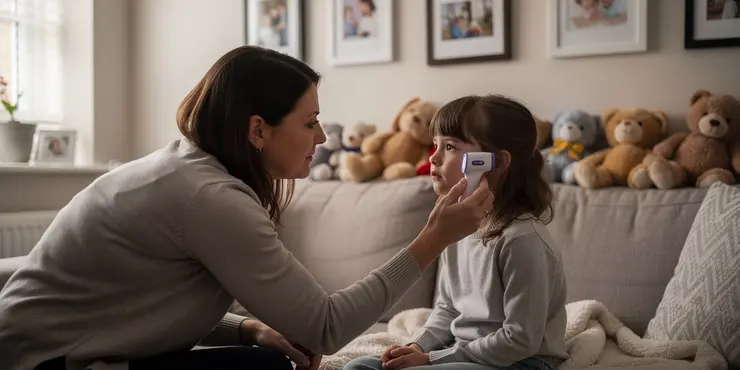
Caring for a child with fever | NHS
Relevance: 38%
-
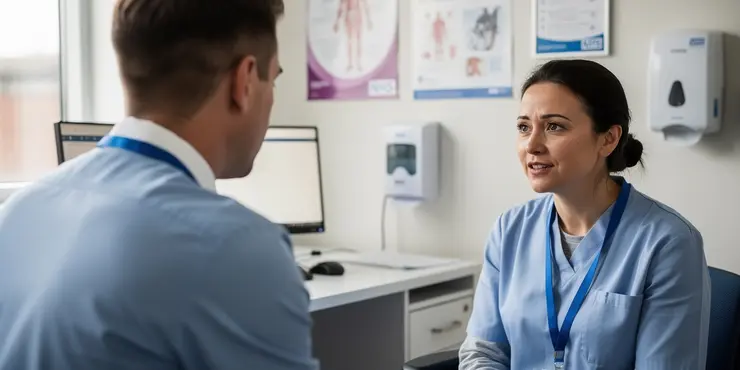
How to treat glandular fever | NHS
Relevance: 36%
-
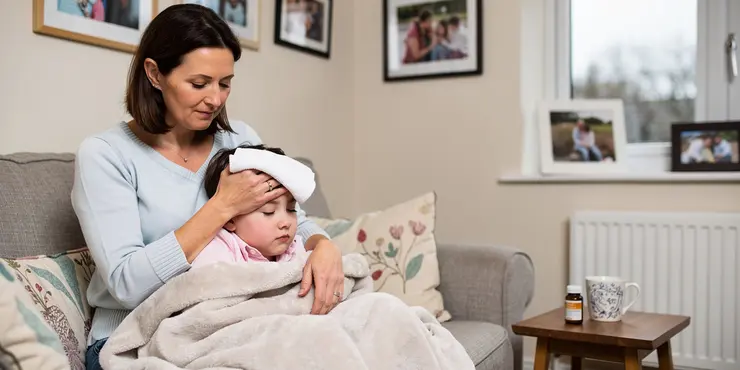
Which medication should be avoided for children with fevers?
Relevance: 32%
-
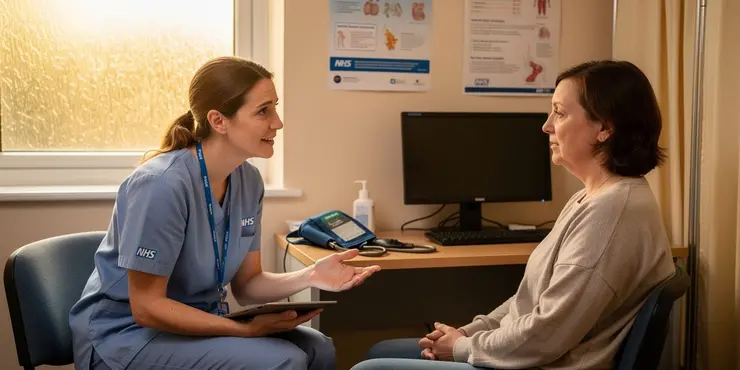
What is Dengue Fever?
Relevance: 31%
-
Can Dengue fever be transmitted through blood transfusions?
Relevance: 29%
-
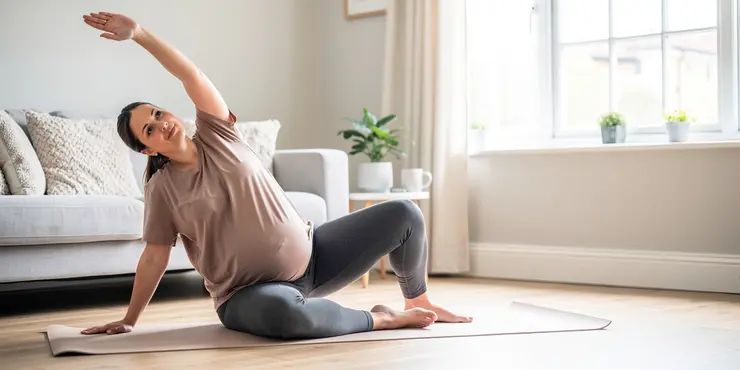
Can lifestyle changes help manage pain and fever during pregnancy?
Relevance: 29%
-
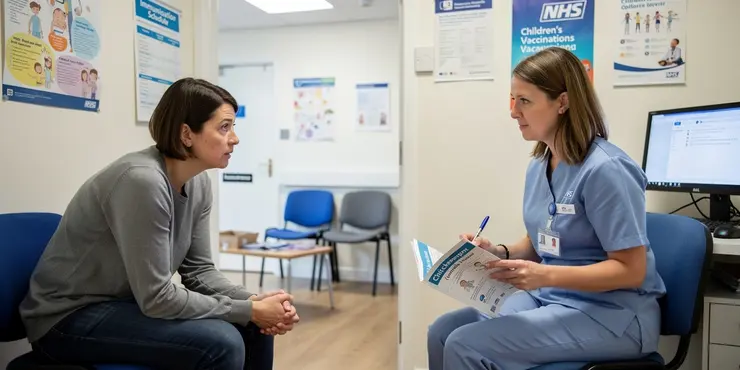
Can chickenpox be prevented?
Relevance: 25%
-
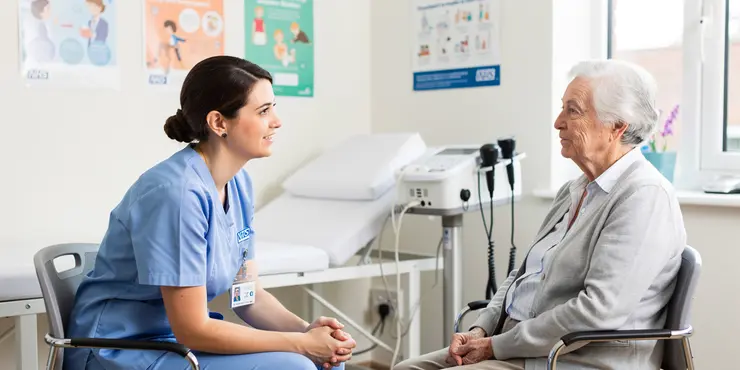
Understanding Seasonal Flu: Prevention and Treatment
Relevance: 24%
-
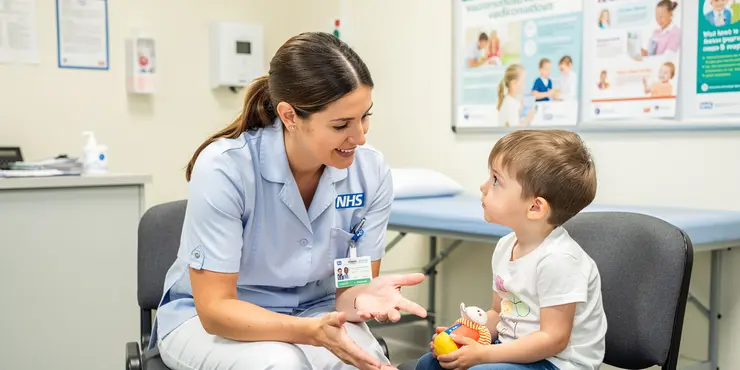
Can meningitis be prevented?
Relevance: 24%
-
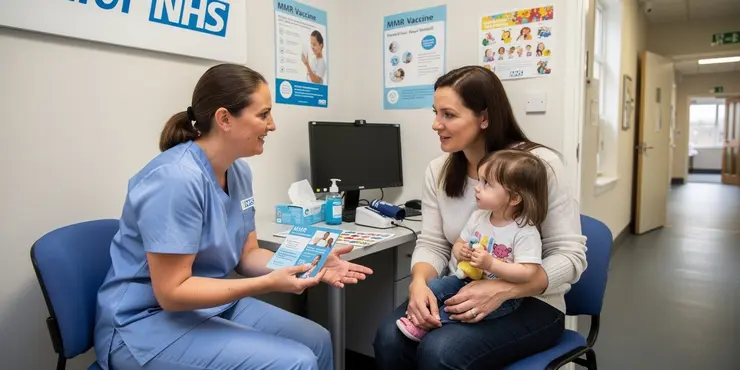
How can measles outbreaks be prevented?
Relevance: 23%
-
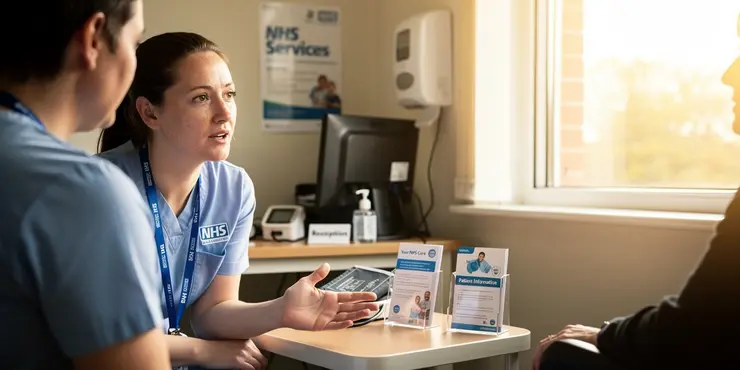
Can Marburg virus disease be prevented?
Relevance: 22%
-

Are there any preventative measures for flesh-eating disease?
Relevance: 21%
-
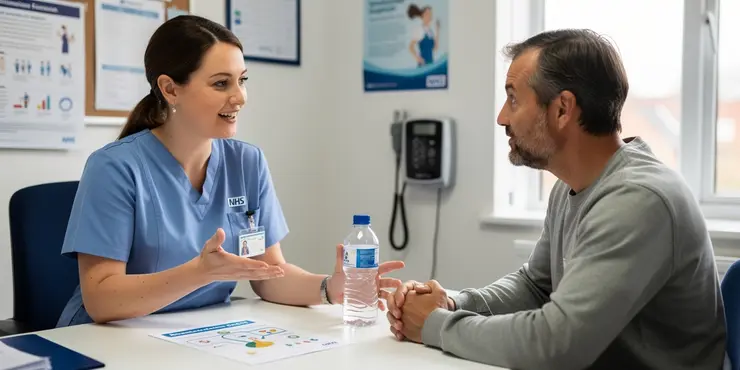
How to prevent dehydration | NHS
Relevance: 21%
-

How can I prevent cold sores?
Relevance: 21%
-
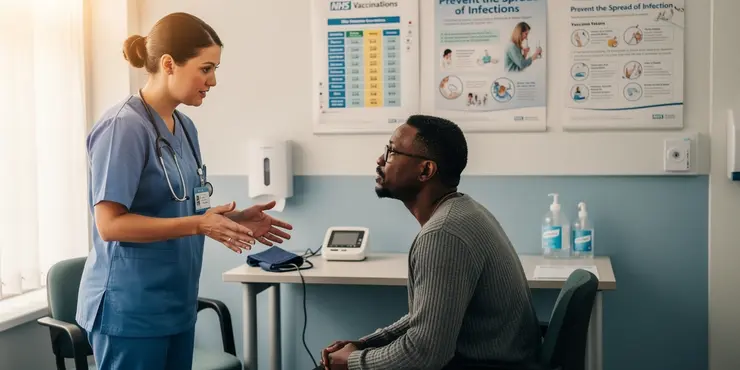
Can the bubonic plague be prevented?
Relevance: 21%
-

Can hypotony be prevented?
Relevance: 21%
Understanding Hay Fever
Hay fever, also known as allergic rhinitis, is a common allergic condition that affects a significant portion of the UK population. It is caused by an allergic reaction to airborne substances such as pollen and mold spores. Symptoms typically include sneezing, runny nose, itchy eyes, and nasal congestion. These symptoms are usually seasonal and coincide with the pollination period of trees, grasses, and weeds.
Can Hay Fever Be Prevented?
While it may not be possible to completely prevent hay fever, there are several strategies that can significantly reduce symptoms and improve quality of life. Prevention focuses on minimizing exposure to allergens and managing symptoms effectively during peak pollen seasons. Here, we outline several approaches to help manage and potentially prevent the onset of hay fever symptoms.
Minimizing Allergen Exposure
The key to preventing hay fever symptoms is to limit your exposure to allergens. During high pollen seasons, stay indoors as much as possible, especially on dry, windy days. Keep windows closed and consider using air conditioning to filter the air. Wearing wraparound sunglasses can help protect your eyes, and regularly washing your face and hair can remove pollen that accumulates throughout the day.
Regularly vacuum your home using a vacuum cleaner with a HEPA filter, and damp dust surfaces to minimize dust and pollen indoors. It's also helpful to wash bedding frequently at high temperatures to remove any pollen that may have settled there.
Preventive Medications and Treatments
Over-the-counter and prescription medications can help prevent hay fever symptoms if taken before pollen season begins. Antihistamines are commonly used to alleviate symptoms, such as sneezing and itching, and nasal corticosteroid sprays can reduce inflammation and nasal congestion. It's advisable to consult with a healthcare professional to determine the most appropriate medication for your needs.
Some people benefit from allergen immunotherapy, which involves gradually introducing the allergen to help build tolerance. While this approach requires a long-term commitment, it can potentially provide lasting relief for those with severe hay fever.
Natural and Lifestyle Approaches
Complementary therapies such as acupuncture and nasal saline irrigation may provide relief for some individuals. Eating a balanced diet rich in fruits, vegetables, and omega-3 fatty acids is thought to support overall immunity. Local honey is sometimes touted as a natural remedy; however, evidence supporting its effectiveness is limited.
Stress management techniques like yoga and mindfulness may also help reduce symptoms by improving overall well-being and immune function.
Conclusion
While hay fever can't be completely prevented, following these strategies can reduce symptom severity and frequency. Early preparation, mindful lifestyle choices, and appropriate medication can together offer a relief-filled hay fever season. If symptoms persist despite preventive measures, consulting a doctor for personalized advice is recommended.
Understanding Hay Fever
Hay fever, also called allergic rhinitis, is a common problem that many people in the UK have. It happens when you are allergic to things in the air like pollen and mold. When you have hay fever, you might sneeze, have a runny nose, itchy eyes, and a stuffy nose. These problems usually happen during certain times of the year when plants release pollen.
Can Hay Fever Be Prevented?
We can't stop hay fever completely, but we can do things to make it better. We try to stay away from things that cause allergies and manage symptoms during the pollen season. Here are some tips to help with hay fever.
Minimizing Allergen Exposure
Staying away from allergens is important for hay fever. When pollen levels are high, try to stay inside, especially on dry and windy days. Keep your windows closed and use air conditioning if you can. Wearing sunglasses can protect your eyes, and washing your face and hair can help remove pollen.
Vacuum your home often using a cleaner with a special HEPA filter, which helps catch pollen and dust. Dust surfaces with a damp cloth and wash your bed sheets in hot water regularly to get rid of pollen.
Preventive Medications and Treatments
Medicines you can buy in a store or get from a doctor can help with hay fever if you start them before pollen season starts. Antihistamines can stop sneezing and itching, and nasal sprays can help with a stuffy nose. Talk to a doctor to find the best medicine for you.
Some people try allergen immunotherapy. This means getting small amounts of the allergen over time so your body gets used to it. This can help a lot but takes a long time to work.
Natural and Lifestyle Approaches
Some people feel better with natural treatments like acupuncture or rinsing the nose with saline water. Eating healthy foods like fruits, vegetables, and fish can help your body's defenses. Some say local honey helps, but we don't know for sure.
Doing things to relax, like yoga or mindfulness, can also make you feel better and stronger.
Conclusion
Even though we can't stop hay fever completely, these tips can help you feel better. Getting ready early, making smart choices, and using the right medicines can make hay fever season easier. If your symptoms don't get better, talk to a doctor for more help.
Frequently Asked Questions
What is hay fever?
Hay fever, also known as allergic rhinitis, is an allergic reaction to airborne substances such as pollen.
Can hay fever be prevented?
While hay fever cannot be completely prevented, its symptoms can be managed and reduced with various strategies.
What are some common triggers of hay fever?
Common triggers include pollen from trees, grasses, and weeds, as well as mold spores, dust mites, and pet dander.
How can I reduce my exposure to pollen?
Stay indoors on high pollen count days, keep windows closed, use air conditioning, and wear sunglasses when outside.
Are there medications to help manage hay fever?
Yes, antihistamines, nasal corticosteroids, and decongestants can help alleviate symptoms of hay fever.
Is it helpful to monitor pollen forecasts?
Yes, checking pollen forecasts can help you plan outdoor activities and take preventive measures.
Can immunotherapy help prevent hay fever?
Allergen immunotherapy, such as allergy shots, can help some people build tolerance to specific allergens.
How does air purifiers help with hay fever prevention?
Air purifiers can help by reducing indoor airborne allergens, thus minimizing exposure to triggers.
Are there any lifestyle changes that can help with hay fever prevention?
Maintaining a clean home, showering after outdoor activities, and avoiding outdoor clothes indoors can help reduce exposure.
Should I avoid outdoor activities completely during hay fever season?
You don’t have to avoid outdoor activities completely, but try to schedule them when pollen counts are lower.
Can a diet help in preventing hay fever symptoms?
A healthy diet with anti-inflammatory foods might help reduce symptoms, but individual results vary.
Does avoiding certain foods prevent hay fever?
Some foods might exacerbate symptoms in those with oral allergy syndrome, but they don't cause hay fever directly.
Can regular cleaning help in preventing hay fever symptoms?
Yes, regular cleaning can remove indoor allergens such as dust mites and pet dander, which can help prevent symptoms.
Is wearing masks effective in preventing hay fever?
Wearing a mask can help filter out pollen and other allergens when outdoors.
Can staying hydrated help with hay fever symptoms?
Staying hydrated can help thin mucus, potentially reducing nasal symptoms.
Are there any natural remedies to help prevent hay fever?
Some people find relief with natural remedies like saline nasal rinses, though effectiveness varies.
Can minimizing pet exposure reduce hay fever symptoms?
Reducing exposure to pets can help if you're allergic to their dander, which can trigger hay fever symptoms.
Can wearing sunglasses help with hay fever?
Yes, sunglasses can help protect your eyes from pollen and reduce symptoms like itchy, watery eyes.
Is there a specific time when pollen counts are typically lower?
Pollen counts are usually lower after rain and higher during dry, windy days or early mornings.
How effective are over-the-counter allergy medications for preventing hay fever?
Over-the-counter medications can be effective for reducing symptoms but may not prevent hay fever completely.
Hay Fever: What Is It?
Hay fever is when you sneeze a lot and your nose feels itchy. This happens because of pollen from plants.
Here are some tips to help:
- Try wearing sunglasses to keep pollen out of your eyes.
- Close windows in your house so less pollen comes in.
- Stay inside when there is a lot of pollen outside.
Hay fever is a kind of allergy. It happens when things in the air, like pollen, make you sneeze or feel itchy.
Can we stop hay fever?
Hay fever makes you sneeze and your nose itchy.
Here are some tips to help:
- Stay inside when the pollen count is high.
- Close windows to keep pollen out.
- Wash your face and hands often.
- Ask an adult for special medicine.
Using these tips can help you feel better!
You cannot stop hay fever completely, but you can make it better. Here are some ways to help:
What can make hay fever start?
These things can cause hay fever:
- Pollen from trees, grass, or flowers
- Dust in the air
- Animal hair or fur
- Mold or damp areas
To help understand these, you can use picture cards with words. Listening to stories about hay fever can help too.
Some things can make allergies flare up. These things are:
- Pollen from trees
- Pollen from grass
- Pollen from weeds
- Mold spores (tiny bits of mold)
- Dust mites (tiny bugs in dust)
- Pet dander (tiny bits of skin from animals)
If you need help, you can use pictures or videos to learn about these triggers. You can also ask someone to read this with you.
How can I spend less time around pollen?
Pollen is tiny particles from flowers. It can make you sneeze or feel itchy. Here are some simple ways to avoid pollen:
- Stay indoors on windy days.
- Close windows in your home and car.
- Wash your hands and face after being outside.
- Use a mask outside during high pollen times.
- Check the pollen forecast before going outside.
These tips can help keep you safe from pollen.
Stay inside when there is a lot of pollen in the air. Keep windows shut, use air conditioning, and wear sunglasses when you go outside.
Can medicine help with hay fever?
Yes, there are some medicines that can help with hay fever. They are called antihistamines, nasal sprays (nasal corticosteroids), and decongestants.
Should you check pollen forecasts?
Yes, looking at the pollen forecast can help you plan what to do outside. It also lets you get ready and stay safe.
Can a special treatment stop hay fever?
Hay fever makes people sneeze and have itchy eyes because of pollen. There is a special treatment that might help. It is called immunotherapy.
Immunotherapy gives you small amounts of what makes you sick. This helps your body get used to it.
Talk to a doctor to see if this treatment is good for you.
Remember to ask questions if something is hard to understand. You can also use pictures or videos to help learn more.
Allergy shots can help some people get used to things they are allergic to. This means they might not have such strong reactions to these things anymore.
If you find reading difficult, try using tools like text-to-speech apps. They can read the text out loud for you. Also, reading with a friend or using a dictionary can be helpful.
How do air cleaners help stop hay fever?
Air cleaners, called air purifiers, clean the air in your home. They take out things that make you sneeze and itch, like pollen and dust. This helps people who get hay fever.
Here’s how they help:
- Takes out pollen: Air purifiers catch pollen, so there is less of it to make you sneeze.
- Cleans dust: Dust can make allergy problems worse. Air purifiers remove dust too.
- Better breathing: Clean air helps you breathe better and feel more comfortable.
Helpful tools:
- Use an air purifier with a HEPA filter. HEPA filters trap tiny allergy things.
- Put the air purifier in the room where you spend the most time.
- Keep windows and doors closed when there is a lot of pollen outside.
Air purifiers can help. They clean the air. This means fewer things in the air that can make you feel bad.
Can I change my daily habits to stop hay fever?
Yes, you can make some changes to help with hay fever. Here are some tips:
- Stay inside when it's windy or when pollen levels are high. You can check the weather report for pollen levels.
- Keep windows and doors closed to stop pollen from coming in.
- Take a shower and change clothes after being outside to remove pollen.
- Wear sunglasses to protect your eyes from pollen.
- Use special air filters at home to keep the air clean.
These tips might help you feel better during hay fever season.
Keep your home clean, take a shower after playing outside, and don't wear outside clothes indoors to stay safe.
Do I need to stay indoors all the time when I have hay fever?
No, you don't have to stay inside all the time.
Here are some tips to help you:
- Check the pollen forecast. Stay indoors when pollen is high.
- Wear sunglasses to keep pollen out of your eyes.
- Wash your hands and face when you come inside.
You can still enjoy being outside with these tips.
You don’t have to stay inside all the time, but try to go outside when there is less pollen in the air.
Can food help stop hay fever?
Eating healthy foods that lower swelling in the body might help you feel better. But it can be different for each person.
Can staying away from some foods stop hay fever?
Hay fever is when things like pollen make you sneeze or have itchy eyes.
Some people think that not eating certain foods might help with hay fever.
If you want to know more, you can:
- Talk to a doctor or nurse.
- Read a simple book about hay fever.
- Ask someone you trust for help.
Some foods can make symptoms worse for people with oral allergy syndrome. But these foods do not cause hay fever.
Can cleaning a lot stop hay fever?
Yes, cleaning often can get rid of things that make us sneeze and itch, like dust and pet hair. This can stop you from feeling sick.
Do masks help stop hay fever?
Wearing a mask can help keep pollen and other things outside from bothering you.
Can drinking water help with hay fever?
Yes, drinking water can help you feel better if you have hay fever. Hay fever can make your nose runny and eyes itchy. Drinking water keeps your body healthy and can make these feelings less strong.
Here are some tips:
- Drink water often during the day.
- Carry a water bottle with you.
- Try to eat fruits and veggies with lots of water, like watermelon or cucumber.
If you need help remembering to drink water, you can use a timer or ask someone to remind you.
Drinking enough water can make mucus thinner, which might help your nose feel better.
Can natural remedies help stop hay fever?
Hay fever is when you sneeze a lot, have a runny nose, and itchy eyes because of pollen from plants. Some natural remedies may help make it better. These remedies are things you can find at home or in nature.
Here are some tips that might help:
- Eat local honey: Some people say that eating honey made by bees in your area might help your body get used to pollen.
- Use a saline rinse: You can rinse your nose with salty water to clear out pollen and make breathing easier.
- Wear sunglasses: Sunglasses can keep pollen out of your eyes when you are outside.
- Wash your clothes: After being outside, wash your clothes and take a shower to remove pollen.
If hay fever makes you feel bad, you can also talk to a doctor or pharmacist. They can help you find other ways to feel better.
Some people feel better using natural treatments like washing their noses with salty water. It works differently for everyone.
Can Being Around Pets Less Help with Hay Fever?
If you are allergic to pets, being around them might make you sneeze or itch. This is called hay fever. Try not to be around pets too much to feel better.
Do Sunglasses Help with Hay Fever?
Wearing sunglasses can help with hay fever. Sunglasses stop pollen from getting into your eyes. Pollen is what makes your eyes itchy and watery during hay fever.
Try wearing wrap-around sunglasses. They cover your eyes better. This way, you are blocking more pollen.
Here are some other tips:
- Wash your hands and face often.
- Stay indoors on windy days.
- Use tissues to catch pollen.
These steps can help make hay fever less bothersome.
Yes, wearing sunglasses can help keep pollen out of your eyes. This can stop your eyes from feeling itchy and watery.
When is there less pollen in the air?
Pollen is often less in the air after it rains. It can be more in the air when it is dry, windy, or early in the morning.
Do allergy medicines from the shop stop hay fever?
Allergy medicine you can buy at the shop can help with hay fever. Some people feel much better after taking them. They can stop you from sneezing and itching.
To make it easier:
- Ask a helper to read the instructions with you.
- Use a calendar to remember when to take the medicine.
- Talk to an adult or doctor if it doesn’t help.
You can buy some medicines from the store that help with hay fever. These medicines can make you feel better, but they might not stop hay fever for good.
Useful Links
This website offers general information and is not a substitute for professional advice.
Always seek guidance from qualified professionals.
If you have any medical concerns or need urgent help, contact a healthcare professional or emergency services immediately.
Some of this content was generated with AI assistance. We’ve done our best to keep it accurate, helpful, and human-friendly.
- Ergsy carfully checks the information in the videos we provide here.
- Videos shown by Youtube after a video has completed, have NOT been reviewed by ERGSY.
- To view, click the arrow in centre of video.
- Most of the videos you find here will have subtitles and/or closed captions available.
- You may need to turn these on, and choose your preferred language.
- Go to the video you'd like to watch.
- If closed captions (CC) are available, settings will be visible on the bottom right of the video player.
- To turn on Captions, click settings .
- To turn off Captions, click settings again.
More Items From Ergsy search
-

Can hay fever be prevented?
Relevance: 100%
-

What is hay fever?
Relevance: 89%
-

Hay fever advice | NHS
Relevance: 85%
-

Do masks help with hay fever?
Relevance: 84%
-

Is there a link between hay fever and asthma?
Relevance: 82%
-

What are the common symptoms of hay fever?
Relevance: 80%
-

Can children develop hay fever?
Relevance: 79%
-

Antihistamines how they work with hay fever
Relevance: 79%
-

Can hay fever occur year-round?
Relevance: 78%
-

Are some people more prone to hay fever?
Relevance: 77%
-

Do pets contribute to hay fever?
Relevance: 77%
-

Is hay fever more common in urban areas?
Relevance: 76%
-

Can diet influence hay fever symptoms?
Relevance: 76%
-

Can hay fever symptoms mimic other conditions?
Relevance: 76%
-

Do all plants produce pollen that causes hay fever?
Relevance: 74%
-

Why are experts warning of rising hay fever cases?
Relevance: 74%
-

How does pollen affect people with hay fever?
Relevance: 74%
-

Self care - hay fever itchy eyes
Relevance: 74%
-

Experts Warn of Rising Hay Fever Cases as Pollen Counts Surge
Relevance: 72%
-

Can mosquito screens help reduce hay fever symptoms?
Relevance: 67%
-

Are there any treatments for hay fever?
Relevance: 60%
-

How long does a typical hay fever season last?
Relevance: 52%
-

Is there a risk of yellow fever being spread by mosquitoes in the UK?
Relevance: 38%
-

Can dengue fever be contracted in the UK?
Relevance: 38%
-

Caring for a child with fever | NHS
Relevance: 38%
-

How to treat glandular fever | NHS
Relevance: 36%
-

Which medication should be avoided for children with fevers?
Relevance: 32%
-

What is Dengue Fever?
Relevance: 31%
-
Can Dengue fever be transmitted through blood transfusions?
Relevance: 29%
-

Can lifestyle changes help manage pain and fever during pregnancy?
Relevance: 29%
-

Can chickenpox be prevented?
Relevance: 25%
-

Understanding Seasonal Flu: Prevention and Treatment
Relevance: 24%
-

Can meningitis be prevented?
Relevance: 24%
-

How can measles outbreaks be prevented?
Relevance: 23%
-

Can Marburg virus disease be prevented?
Relevance: 22%
-

Are there any preventative measures for flesh-eating disease?
Relevance: 21%
-

How to prevent dehydration | NHS
Relevance: 21%
-

How can I prevent cold sores?
Relevance: 21%
-

Can the bubonic plague be prevented?
Relevance: 21%
-

Can hypotony be prevented?
Relevance: 21%


